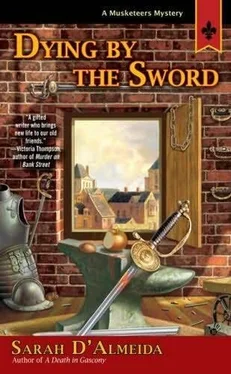Sarah D'Almeida - Dying by the Sword
Здесь есть возможность читать онлайн «Sarah D'Almeida - Dying by the Sword» весь текст электронной книги совершенно бесплатно (целиком полную версию без сокращений). В некоторых случаях можно слушать аудио, скачать через торрент в формате fb2 и присутствует краткое содержание. Жанр: Триллер, на английском языке. Описание произведения, (предисловие) а так же отзывы посетителей доступны на портале библиотеки ЛибКат.
- Название:Dying by the Sword
- Автор:
- Жанр:
- Год:неизвестен
- ISBN:нет данных
- Рейтинг книги:4 / 5. Голосов: 1
-
Избранное:Добавить в избранное
- Отзывы:
-
Ваша оценка:
- 80
- 1
- 2
- 3
- 4
- 5
Dying by the Sword: краткое содержание, описание и аннотация
Предлагаем к чтению аннотацию, описание, краткое содержание или предисловие (зависит от того, что написал сам автор книги «Dying by the Sword»). Если вы не нашли необходимую информацию о книге — напишите в комментариях, мы постараемся отыскать её.
As the Four Musketeers race to save Porthos's servant from the gallows, they run afoul of Cardinal Richelieu, who is investigating a far more serious matter – a plot against the life of the king.
Dying by the Sword — читать онлайн бесплатно полную книгу (весь текст) целиком
Ниже представлен текст книги, разбитый по страницам. Система сохранения места последней прочитанной страницы, позволяет с удобством читать онлайн бесплатно книгу «Dying by the Sword», без необходимости каждый раз заново искать на чём Вы остановились. Поставьте закладку, и сможете в любой момент перейти на страницу, на которой закончили чтение.
Интервал:
Закладка:
This brought him an intent look from the blue eyes so dark that they might as well be black, and a slight frown that was, strangely, apologetic. “I didn’t suppose you did,” Athos said. “I am fairly sure the three of you were just proceeding in the way you normally do.” He pressed his lips together, as if this were a great crime, then looked up at Aramis. “I told you not to go to the palace.”
“I had to,” Aramis said. “I had to speak to Hermengarde.”
“Alone? Are you perhaps courting Mousqueton’s girl-friend?”
“No,” D’Artagnan said, jumping into the conversation, because he had seen Athos and Aramis fight before, and it was not something he wished to see again. Porthos and Aramis fought all the time, the sort of amiable squabbling that caused one to think of a litter of newborn puppies in a basket, stepping all over each other and nipping at each other’s ears with no malice and no rancor-or memory of injury-held.
But perhaps because they were so highborn and trained to it, as great noblemen were, when Athos and Aramis argued it was all pale, drawn faces, and the sort of look that true enemies gave each other, not friends who merely disagreed on some point. Besides, this one fact was the sort of thing that would make Athos very irate, and an irate Athos could be an unbearable Athos. As the oldest and noblest of all of them, the erstwhile count held himself responsible not just for D’Artagnan, but for all of them. But his wish to protect them often demanded that they obey him, something that Aramis more than the others rebelled against. So he intervened hastily, trying to deviate the conversation. “No, but the armorer’s son wished to.”
“The armorer’s son?” The question came from both Porthos and Athos, at once.
D’Artagnan shrugged. “At least that is what the neighbors thought. That the armorer’s son, the young Langelier, wished to make Hermengarde his wife, while the armorer wished for Mousqueton to marry his daughter.”
“The armorer’s daughter?” Porthos asked, bewildered. “Is that what they told you? I cannot credit it. Mousqueton never told me.”
D’Artagnan was much too kind to explain that, given Porthos’s sometimes ambiguous relationship with the French language, it was quite possible that Mousqueton had indeed told him, but that the whole thing had got twisted in Porthos’s own mind into a conversation about some different subject-as perhaps the price of swords, or maybe even of fish. Instead he said, “I don’t know how seriously Mousqueton would have considered it, but the neighbors-at least the Gascon baker I spoke to-and his family, seemed to take it quite as a given.”
Athos was frowning at D’Artagnan. “I wish you wouldn’t speak,” he said. “You have bled a great deal.”
D’Artagnan, despite dizziness induced by blood loss and not improved by brandy, shook his head. “Oh, it is nothing,” he said. “Planchet, could you give me my shirt?” And then to his friend, “I just got slightly cut. Most of what appears to you to be blood comes from washing the wound and getting the water mixed with blood, so that there seems to be a great deal more of it than there ever was.”
Athos looked at Aramis over D’Artagnan’s head, and because there didn’t seem to be hostility in that look, D’Artagnan didn’t feel obliged to speak up. He had the impression that Aramis had shrugged. “It is bad enough,” he said, in a low voice. “As you saw, the cut is very deep and, in fact, he bled a great deal, in the palace gardens, before we could stop it. You must not be so alarmed though. I stopped most of the bleeding there. The very little he bled here can’t have made his case much worse.”
And Athos, who appeared thunderstruck and at a loss for words, shook his head. He looked at D’Artagnan allowing, for just a moment, a glimmer of humor into his severe countenance. “All of you, my friends, tempt me to say, with Monsieur de Treville, that such noble men shouldn’t risk themselves in such foolish ways.”
Aramis gave a soft chuckle, echoed by D’Artagnan himself, and Porthos snorted in amusement. “He only says that when he is pleased with us, usually because we have risked ourselves in foolish ways. Only let us be taken by the guards of the Cardinal without a fight, or let us do the prudent thing and abandon a scene of trouble, and he will proclaim us the most scurvy and worthless men who ever lived. And he will give us no quarter.”
Athos inclined his head, but the tension in his bearing seemed to have broken. D’Artagnan, who was starting to read his friends very well indeed, suspected that Athos had come in furious at something and that this anger had colored the scene that had greeted him. Ire mingled with worry had made him, for a moment, wish to pick a quarrel with any of them, so that he could either justify his annoyance or stop worrying. And Aramis would have risen to the bait.
But perhaps his own confusion had helped or perhaps Athos’s sense of humor had reasserted itself. He sighed, in exasperation. “Let’s suppose we take this from the beginning and one at a time, then. D’Artagnan, am I to understand that you gathered information from a Gascon family?”
D’Artagnan nodded. “I was starting to think I couldn’t do it at all,” he said. “You know… lie to someone. But this bakery was very busy and it smelled and sounded like home.” He shrugged. He had wanted to come to Paris and seek his fortune. He had been blessed indeed to make friends with the best of the musketeers within days of his arrival. He would be the worst of wretches if he let his friends know how often or how much he missed the province of his birth. “So I went in and the baker invited me to dinner, and… well… I heard the neighborhood’s gossip. I would doubtless have heard more, but there was this big eruption of noise from the armory, and I… well… I went in and found Porthos.”
Athos’s observant eyes looked towards his larger friend. “And you, Porthos?”
“Well…” Porthos took a deep breath. “I remembered to take a candle, but I totally forgot to procure some melons.”
Aramis snorted. “Porthos! Melons are not in season, and what can your lack of melons have to do with your making a racket in the armorer’s? What were you even doing in the armorer’s?”
“Well… I’d heard that Mousqueton had lost consciousness after being hit a glancing blow by a hammer that fell from the high rack over the forge.”
“And you realized, as I did,” Athos said, “that you had been in that shop a lot of times, that you knew the ceiling was very high, and that you didn’t remember seeing any hammers hanging from the rack.” He looked at Porthos with something approaching benevolence. “But with your turn of mind, you needed, of course, to go and test the idea.”
“Well… I didn’t drop hammers on my own head.”
Aramis, to D’Artagnan’s side, rolled his eyes. “Something for which we should be very grateful indeed. But why did you need to make noise?”
Porthos shrugged and Athos shook his head, and asked him, “Did any of the swords fall? Or the hammer if you managed to hang it there?”
Porthos looked relieved and shook his head, and Athos nodded. “And that brings us to you, Aramis. You went to the palace and you spoke to Hermengarde, which brings us to…”
“She said she… she had decided to marry Mousqueton,” he said, lamely, not wishing to discuss Hermengarde’s possible impending motherhood with the servants present.
“Hermengarde is with child, sir,” Grimaud said, and gave Athos a sideways glance. “Or at least Mousqueton believed so and believed the child was his.”
D’Artagnan, by the corner of his eye, saw Porthos pale and sit down. “With child?” he said. “This too, Mousqueton did not tell me.”
Читать дальшеИнтервал:
Закладка:
Похожие книги на «Dying by the Sword»
Представляем Вашему вниманию похожие книги на «Dying by the Sword» списком для выбора. Мы отобрали схожую по названию и смыслу литературу в надежде предоставить читателям больше вариантов отыскать новые, интересные, ещё непрочитанные произведения.
Обсуждение, отзывы о книге «Dying by the Sword» и просто собственные мнения читателей. Оставьте ваши комментарии, напишите, что Вы думаете о произведении, его смысле или главных героях. Укажите что конкретно понравилось, а что нет, и почему Вы так считаете.











